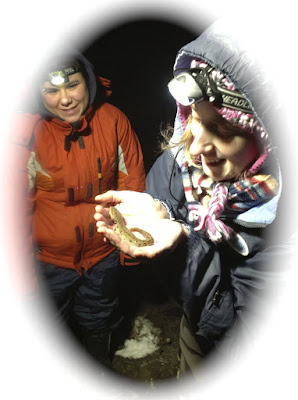Mudpuppy Night in Oxford Mills
 ....the only place in Canada where you can wade among giant salamanders every Friday night through the winter!
....the only place in Canada where you can wade among giant salamanders every Friday night through the winter!
...every Friday evening from the firstFriday after Thanksgiving until spring high water. The best Mudpuppy viewing in Ontario! Flat bedrock and clear shallow water provide safe footing for researchers and spectators of giant aquatic Salamanders pursuing their winter activities. The rocky clear-water Kemptville Creek from the dam at Oxford Mills to the Prescott Street Bridge in Kemptville is the best place to see Mudpuppies in eastern Ontario.
 On a cold winter night we have seen up to 180 Mud-puppies prowling the creek bottom - and afterwards, retire to the Brigadoon Restaurant to drink coffee, eat desserts, and talk about Mudpuppies and everything else!
On a cold winter night we have seen up to 180 Mud-puppies prowling the creek bottom - and afterwards, retire to the Brigadoon Restaurant to drink coffee, eat desserts, and talk about Mudpuppies and everything else!We begin each Friday evening at 8:00, assembling on the County Rd. 18 bridge below the dam. Wear gumboots and put new batteries in your flashlights!

Mudpuppy Night in Oxford Mills has been bringing people face to face with Mudpuppies in the wild since 1998. Since 1998 Mudpuppy Night in Oxford Mills has been taking observers to the only place in Ontario where Mudpuppies have been repeatedly observed in large numbers throughout the winter.
The longest-running winter herpetological outing in Canada. In 2005 Mudpuppy Night was awarded the CARCNET Silver Salamander Award for local herpetological conservation and education.
Mudpuppies, Necturus maculosus, are foot-long permanently aquatic Salamanders. They retain the gills and smooth skin of larvae as adults, and go undetected in many water-bodies because of their secretive habits. Mudpuppies are slow and cautious, though they can swim nearly as fast as a fish on occasion. In May females deposit 50-150 eggs on the underside of a flat rock. The female guards the eggs, and attends the larvae after they hatch.
About 25 years ago herpetologists realized that Mudpuppies are active, and feed actively, all winter, because they can be caught in baited minnowtraps in the winter but not in the summer. Mudpuppies were long famous for having more DNA in each cell than just about any other animal, and this winter activity has shown that the abundant DNA provides Mudpuppies with the array of temperature-adjusted enzymes they require to remain active in water from 0°-32° C. Mudpuppies are fairly common in the Ottawa River and its major tributaries, north to the Arctic Watershed, and the Canadian range extends through southern Quebec, Ontario and Manitoba.
To let us know you're coming, please contact us by phone at (613)258-3107, or e-mail bckcdb@istar.ca
There's no registration fee, but donations are welcome.
About 25 years ago herpetologists realized that Mudpuppies are active, and feed actively, all winter, because they can be caught in baited minnowtraps in the winter but not in the summer. Mudpuppies were long famous for having more DNA in each cell than just about any other animal, and this winter activity has shown that the abundant DNA provides Mudpuppies with the array of temperature-adjusted enzymes they require to remain active in water from 0°-32° C. Mudpuppies are fairly common in the Ottawa River and its major tributaries, north to the Arctic Watershed, and the Canadian range extends through southern Quebec, Ontario and Manitoba.
To let us know you're coming, please contact us by phone at (613)258-3107, or e-mail bckcdb@istar.ca
There's no registration fee, but donations are welcome.


Comments
Post a Comment